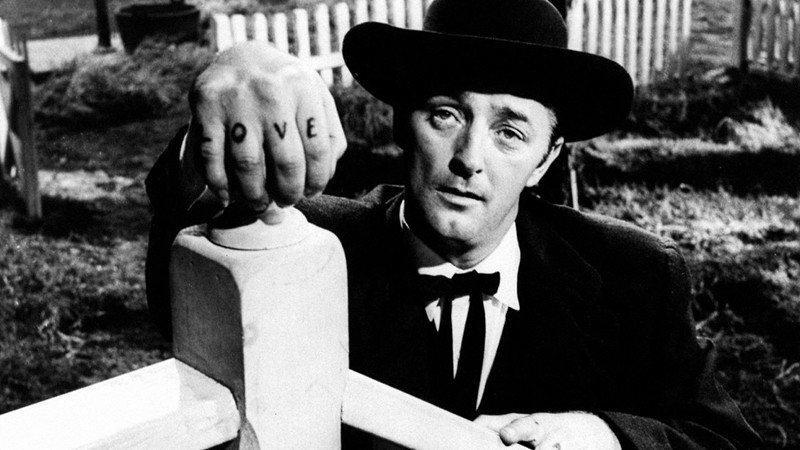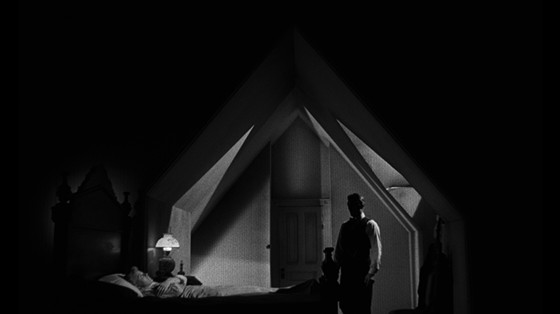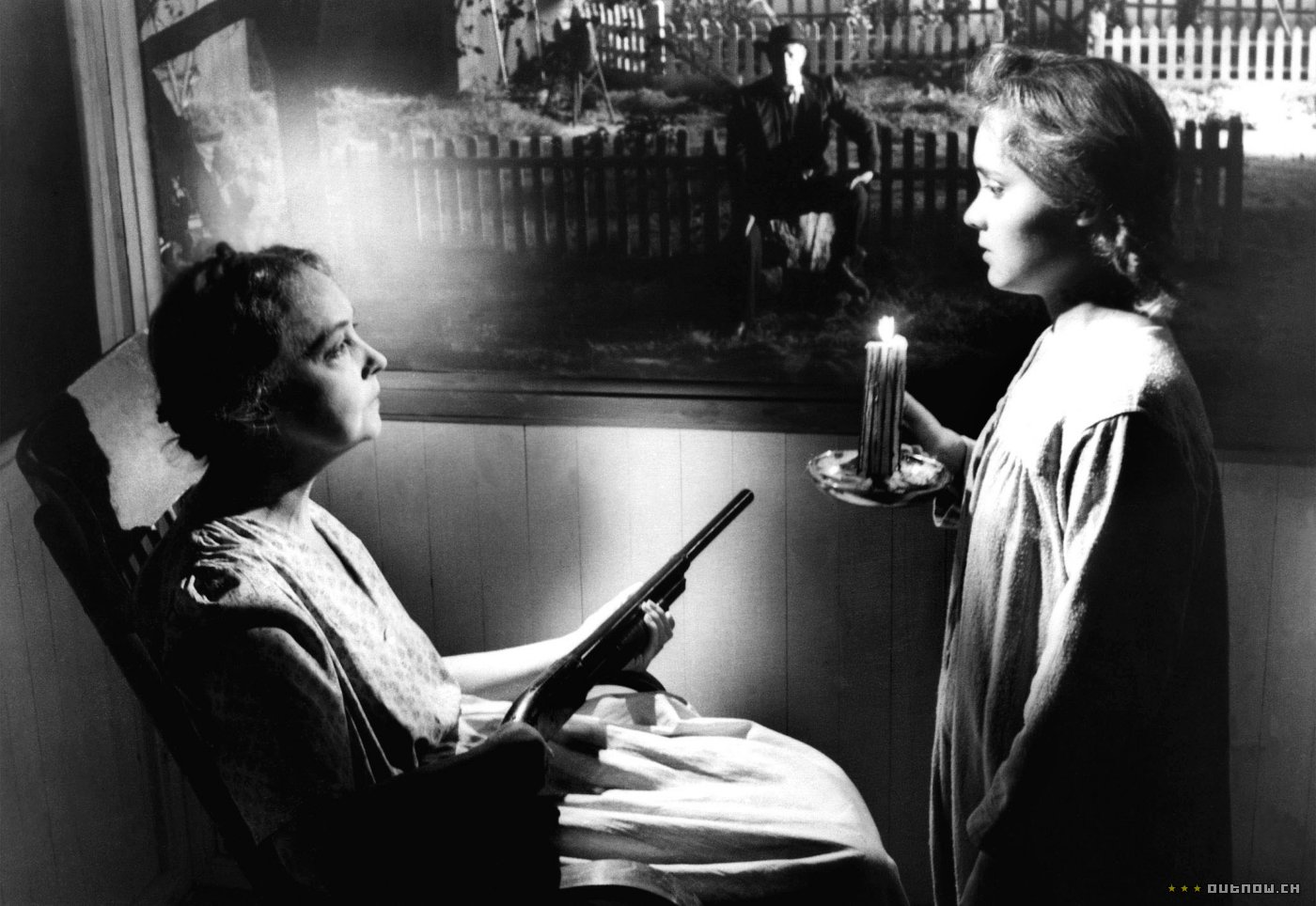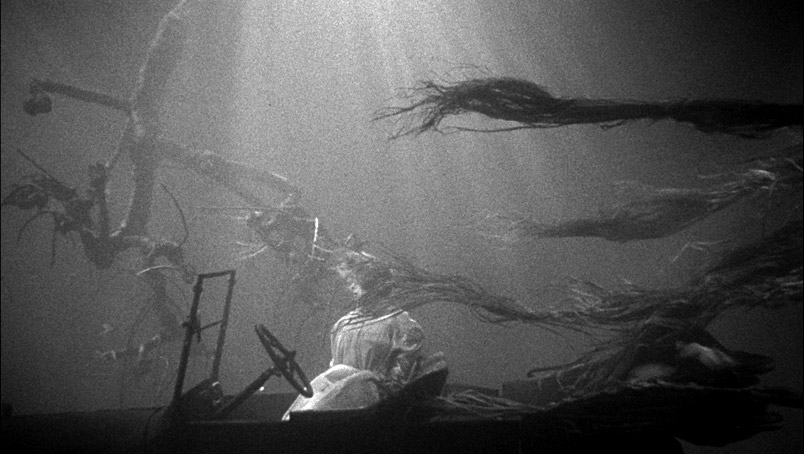
“Dream, little one, dream
Oh, the hunter in the night
Fills your childish heart with fright
Fear is only a dream
So dream, little one, dream…”
Those lines, from the score “Lullaby”, written by Walter Schumann, are profoundly unsettling, partially because a choir of children credulously sing them, but also because of the creepy-crawly context of the film for which they were written.
Perhaps the quintessential American horror story, 1955’s The Night of the Hunter outstrips and outperforms its peers thanks to Charles Laughton––the brilliant British stage and screen actor of such classics as Jamaica Inn, and Mutiny of the Bounty.
Laughton’s The Night of the Hunter, the one and only film he would ever direct, correctly casts an impossibly bleak and strange shadow in the annals of cinema. And a singular shadow at that, for it has no equal, and to come near to it isn’t wise, for it’s not simpatico to its quarry, and we are all its quarry, and any who submit to its abundant charms cannot breathe easy. Its ideology is too unsettling and its price––the loss of innocence––too high.
In the still of the night

It’s shocking, shameful, and downright deplorable that The Night of the Hunter was so poorly received upon its initial release. Its unconventionality and highly imaginative agenda overwhelmed critics and audiences alike, who, spooked by its courage and bold breadth of view, attacked it. The notices were vicious, and confused at best.
Its blending of slapstick horror and gallows humour was lost on an audience ill-equipped for such hyperbole. Humiliated and affronted, Laughton, dismally, never directed again. Of course, when history caught up with The Night of the Hunter, dignity and distinction was restored but it’s still lamentable to think what other gifts Laughton may have bestowed upon us had his directorial debut been cradled instead of choked.
Based off of Davis Grubb’s 1953 thriller novel of the same name, Laughton’s interpretation of The Night of the Hunter is a whirling pictorial dervish, a beautiful traumatic fable about a brother and a sister. Set in the Dust Bowl era, America is in the clinches of the Depression, but this is no history lesson.
This is a tale of two children, weakened and pursued by hysterical religiosity and the ignorance of the adult world. Clearly, this is a work of awe and evil, of enchantment and horror. That Christianity and class warfare are oppressive factors to the lives of adolescence also speaks volumes for America. Make no mistake, The Night of the Hunter is an opiate-addled fairytale for grown-ups from the perspective of off-course and unloved children.
“It’s a hard world for little things.”
–Rachel Cooper (played by Lilian Gish)

The plot is casually simplistic; Ben Harper (Peter Graves, who would become a huge star years later on TV’s Mission: Impossible), a deadbeat dad and hopeless husband, also a crook, is to be hanged for his role in a robbery.
Before his capture he hides his share of the loot in the doll of his young daughter, Pearl (Sally Jane Bruce, sensational), and confides this in his son, John (Billy Chapin, excellent as the true-blue crux of the film). Their mother, Willa, wisp-like and pale, portrayed like a doomed dream by Shelley Winters (A Place in the Sun, A Patch of Blue) is one of many adult characters in the film who are practically useless in protecting the children.
Their daddy, put to death, leaves the children fatherless, their mother, little more than a shadow, all but abandons the siblings until the day when Reverend Harry Powell––a macabre Robert Mitchum in what would become perhaps his most recognizable role––a false prophet and shyster, arrives. Powell, an evangelical fanatic, magnetic to their mother and the townsfolk, but menacing to them, knows their poppa from prison, and knows also that they have graft from the robbery, hidden somewhere.
“Within The Night of the Hunter is the folkloric tale itself, with its ogre (played by Mitchum). His name is Harry, as in ‘Old Harry’, vernacular for the Devil. Cross Richard the Third with Milton’s Satan and enclose him in a Southern psychopath posing as a preacher, and this character is what you’d get. He cannot be explained by the Depression – he is simply radical evil – but, in Laughton’s hands, he’s a complex figure as well, one of those fast-talking conman who recur throughout American art, embraced by society, then torn apart by it. He’s a monster, but finally a sacrificial one.”
–Margaret Atwood
Mary Mary what your man said

In one of cinemas most chilling and troubling tableaus, Harry dupes Willa to a watery grave. Though her murder is offscreen, the underwater effigy of her tied to her automobile, throat slit, softly swaying amidst seaweed subterfuge, framed with painterly precision, is a ghoulish godsend.
It’s Southern Gothic writ large, with a Grimm Brothers embellishment that could also stand beside the Bard and his drown Ophelia. It makes poetic sense while raising the risk and the radius of Pearl and John, now orphans, religiously they set forth to tame the darkest forests of the night.
Laughton together with legendary cinematographer Stanley Cortez (The Magnificent Ambersons, Shock Corridor), strove for and achieved a German Expressionism-meets-Film Noir composite, one overflowing with high-contrast, and jagged angles. The resulting distortion of reality worked flawlessly to belie and exaggerate the emotional onscreen experience.
The atmosphere of browbeaten dread and mounting terror overwhelms and transforms The Night of the Hunter into a surrealist standard. It’s no wonder that modern innovators like the Coen Brothers, Spike Lee, David Lynch, Terrence Malick, and Martin Scorsese site the film as a major influence.
As John and Pearl flee from Harry, their Mark Twain-meshing-with-Max Ernst odyssey is fraught with shadows and superstition. When the strays finally find an adult capable of accepting and protecting them it’s in the form of Rachel Cooper, an eccentric old woman played with urgency by the great Lillian Gish (Intolerance, Duel in the Sun).
The casting of the film is impeccable. The performances, for the most part, are exaggerated and sometimes jarringly so, consistent with the real-world-turned-nightmare motif. Gish as protective matriarch, glows, and Mitchum’s murderer makes for a veritable heart of infinite darkness. The sequence where the two sing “Leaning on the Everlasting Arms” begins with black humour but concludes with catastrophic suspense in another landmark episode.
“Salvation is a last-minute business, boy.”
–Rev. Harry Powell (played by Robert Mitchum)
The Night of the Hunter overflows with nocturnal panic, preying on a childlike fear of the dark, and the adult assertion of cruelty and persecution. A stolen doll becomes an emblem for innocence made absent, a riverside trek, bird-dogged by a deistic bully, further clouds the child’s-eye-view of a mature terrene that has lost its baby teeth. Will the first blush of dawn ever erase what the night has revealed?
Author Bio: Shane Scott-Travis is a film critic, screenwriter, comic book author/illustrator and cineaste. Currently residing in Vancouver, Canada, Shane can often be found at the cinema, the dog park, or off in a corner someplace, paraphrasing Groucho Marx. Follow Shane on Twitter @ShaneScottravis.